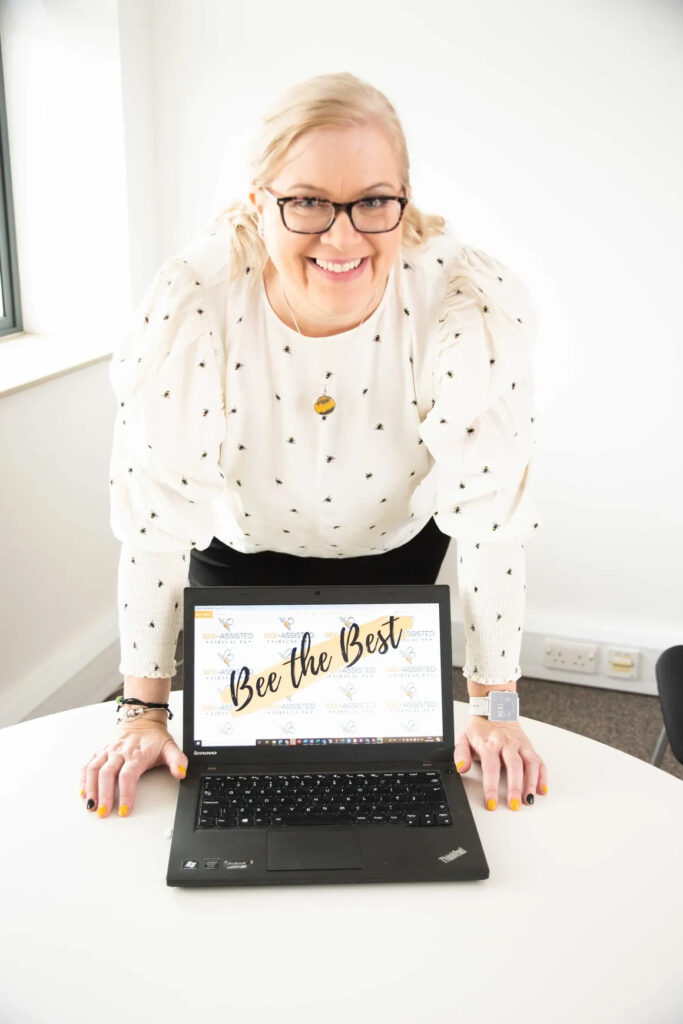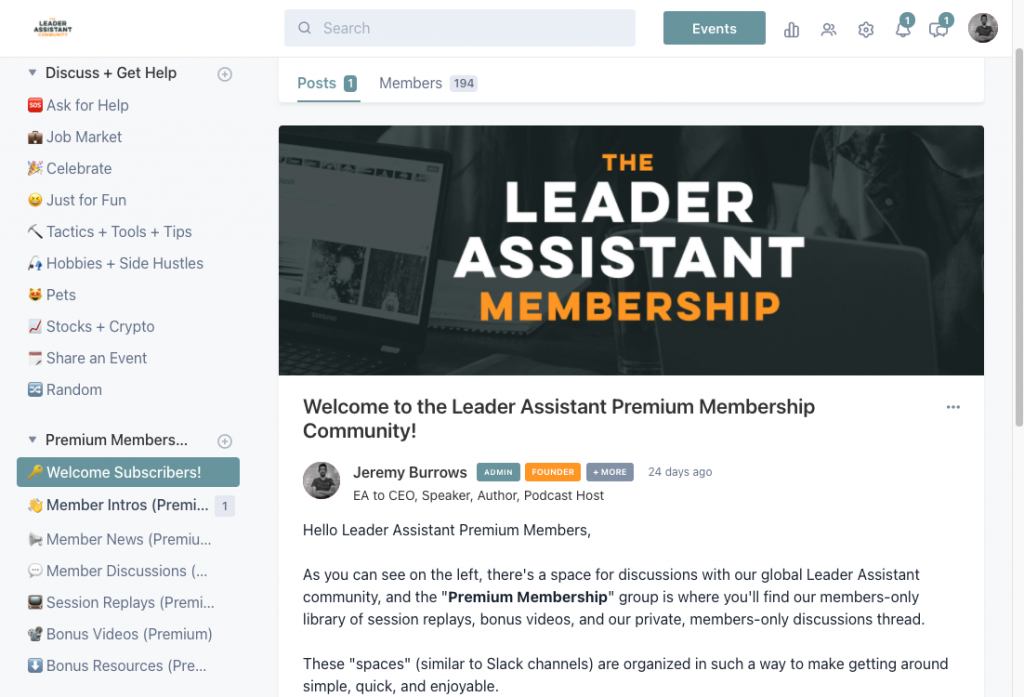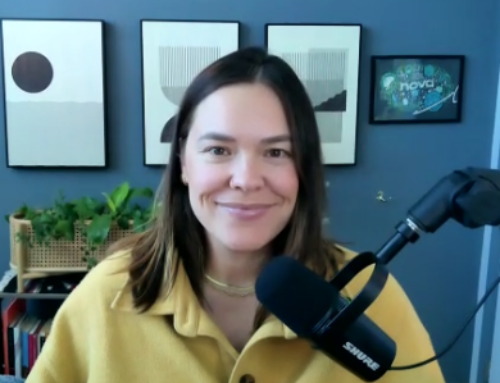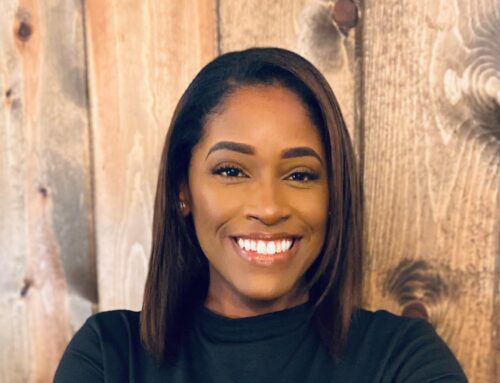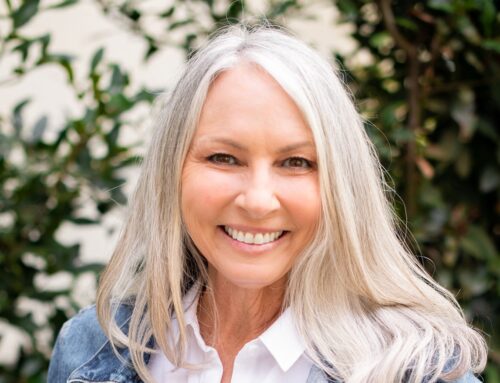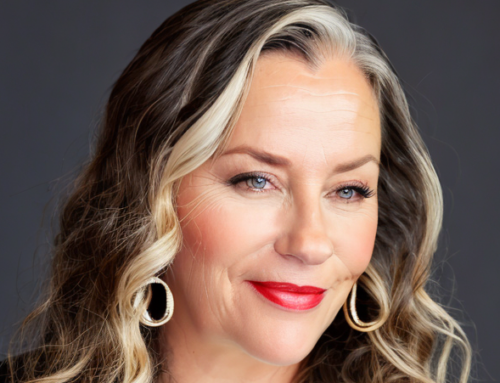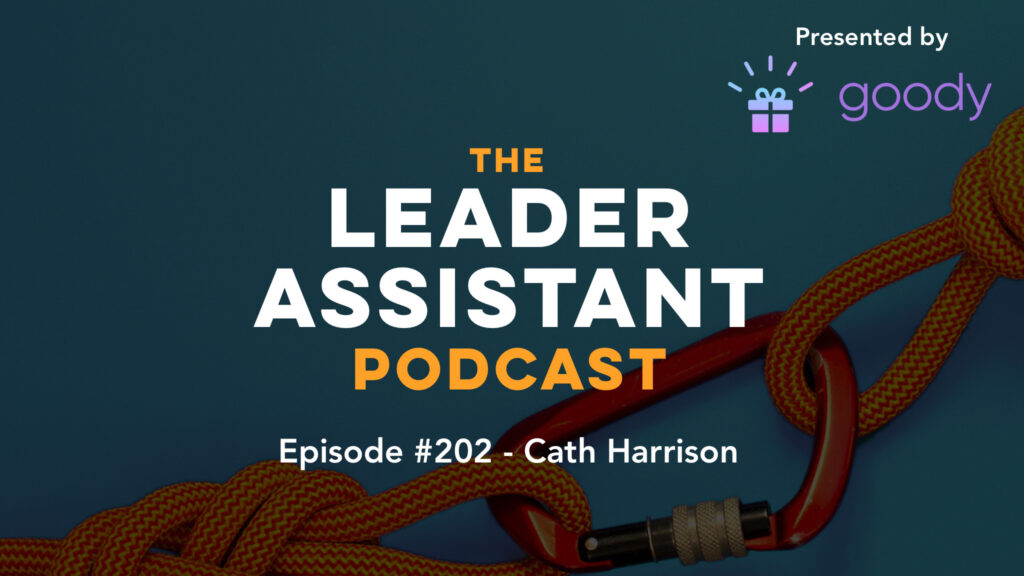
Cath Harrison has a 35 year career in PA, EA and administrative roles in various private and public sectors, including over 17 years working within the IT Industry for Hewlett-Packard.
In this episode, Cath talks about being let go during a global pandemic, starting a new business, and the world’s shift to remote work.
LEADERSHIP QUOTE
You don’t need a new day to start over, you need a new mindset.
CONNECT WITH CATH
ABOUT CATH
Cath Harrison is a Fellow of the Institute of Administrative Management (FInstAM) and of the Executive Personal Assistants Association (EPAA) with a 35 year career in PA, EA and administrative roles in various private and public sector organizations, including over 17 years working within the IT Industry for Hewlett-Packard.
In 2020, faced with redundancy brought about by a global pandemic, a recent divorce, along with a shortage of available roles because of the Covid Lockdown, Cath was given no option but to go it alone as a Virtual PA, and Bee-Assisted Limited was born. Since launch, Cath has had a massive change in mindset, grown confidence, faced challenges, and learned new skills along the way.
THE LEADER ASSISTANT PODCAST IS PRESENTED BY GOODY
A special thanks to my sponsor, Goody!
If you send business gifts to employees, clients or sales prospects, Goody is a game changer. You can send one gift or hundreds at the same time, without ever worrying about shipping details. With Goody, your gift recipients provide all their shipping info, and they can even swap out your gift for another option if they prefer. It’s free to start gifting and you get a $20 credit when you sign up. Oh and if you mention you heard about Goody on The Leader Assistant Podcast, Goody will add an extra $10 credit to your account.
Go here to start gifting today!
THE LEADER ASSISTANT PREMIUM MEMBERSHIP
To learn more about how you can join growth-minded Leader Assistants, check out our Leader Assistant Premium Membership for ongoing training, coaching, and community.
THE LEADER ASSISTANT BOOK
Download the first 3 chapters of The Leader Assistant: Four Pillars of Game-Changing Assistant for FREE here or buy it on Amazon or Audible.
LEADER ASSISTANT LIVE EVENTS
Check out our constantly updated schedule of events for admins and assistants at LeaderAssistantLive.com. Including our all-day, online leadership workshop at leaderassistantlive.com/workshop.
JOIN THE FREE COMMUNITY
Join the Leader Assistant Global Community here, or the Facebook Group here for bonus content and to network with other assistants who are committed to becoming leaders!
SUBSCRIBE
Subscribe to The Leader Assistant Podcast so you don’t miss new episodes!
You can find the show on Apple Podcasts, Spotify, Google Podcasts, Pandora, and Stitcher.
Join my email list here if you want to get an email when a new episode goes live.
LEAVE A REVIEW
If you’re enjoying the podcast, please take 2 minutes to rate and review the show on Apple Podcasts here. Each review helps me stay motivated to keep the show going!
—
EPISODE TRANSCRIPT
Cath Harrison 0:00
Hi, I’m Cath Harrison. I’m a virtual pa from the UK. My favorite quote is you don’t need a new day to start over you need a new mindset
Podcast Intro 0:16
The Leader Assistant Podcast exists to encourage and challenge assistants to become confident game changing leader assistants
Jeremy Burrows 0:32
The Leader Assistant Podcast is exclusively brought to you by goody which provides effortless gifting for all occasions. If you’re tired of sending tacky impersonal business gifts, then you should definitely check out goody my friends at goody offer a collection of hundreds of curated brands like Levain bakery, Thera body, milk bar, and Ember mugs. With goody, if your recipient doesn’t like your gift, they can swap it out for one they do like you can find perfect gifts for any occasion. Whether it’s work anniversaries, birthdays, new hire onboarding or company swag. It’s free to start gifting and you’ll get a $20 credit when you sign up. Also, be sure to mention The Leader Assistant Podcast when signing up and goody will add an extra $10 credit to your account. So go to leaderassistant.com/goody to disrupt the inefficiencies in your team’s gifting strategy. Again, that’s leaderassistant.com/goody. Hey friends, welcome to The Leader Assistant Podcast that your host Jeremy Burrows and I’m excited to be speaking with Cath Harrison today. Cath has a 35 years of experience in the PA administrative roles throughout her career, and we’re on episode 202 You can check out the show notes at leaderassistant.com/202. Cath how’s it going?
Cath Harrison 2:04
Hi. Hi. Nice to meet you.
Jeremy Burrows 2:07
Yeah, what part of the world are you in?
Cath Harrison 2:09
I’m actually based in Darby, which is Derbyshire it’s in the UK. And I’m kind of right in the middle of the UK. So, yeah, um, um, I’ve always lived in in the Midlands.
Jeremy Burrows 2:24
Okay. What, uh, what’s something about you personally have kids dogs, cats, hobbies?
Cath Harrison 2:32
I have. Okay, so I’ve got two two boys. They’re 20 and one the other ones 18 Next week. And so my eldest son, he’s actually deaf. He’s profoundly deaf. And they’re both working. We’ve got three dogs. I’m not married and divorced, but got divorced. 2017. So yeah, I’ve we’ve got three dogs that I tend to try and juggle during the day and work. So yeah, it’s, it’s been busy. My sons decided that they were going to they were going to buy these puppies during lockdown. And now they’ve gone back to work. Looking after the dogs,
Jeremy Burrows 3:18
you’re stuck with the dogs.
Cath Harrison 3:20
I’m stuck with the dogs at home. Yeah.
Jeremy Burrows 3:22
Nice. Well, let’s, yeah, thanks for sharing. Tell us a little bit about your career journey and how you became an assistant and then we can go through that whole process and where you’re at now.
Cath Harrison 3:35
Okay, well, okay. So a long, long time ago, I left school when I was 15. So I’m, I’m 51. Now. So at 15 I left school. And I went to Well, I went I went to work as luck. It was called a youth training scheme. And it was almost like an apprenticeship for office for an office role back in the day. It was on 27 pounds 50 a week. And it was like a two year thing where you did work. You worked in an office environment and you went to college for one day and studied Business Studies. So that’s where I started. I did that for two years. And that was in in Darby with Dobby it if I don’t know whether you know but it is a big train making part of the UK we kind of have a quite a big railway industry here and Derby is like the center of it. And it was actually with British Rail engineering limited that I got that role initially. So after the YT has finished after the two years, I stayed on for another six years as PA to the planning manager and Yeah, so I worked there for eight years. Unfortunately, at that time, there was a lot of like privatization of the railways. And there was a lot of kind of redundancies looming and things like that. And I’d actually met somebody who went on to be my husband, but we worked both worked in the same place. So it was a bit of kind of all of your eggs in one basket thing. And with the redundancies, it was probably best that one of us didn’t work there and didn’t both end up getting made redundant. So I decided that I would leave and try and find another role. And also in those kinds of industries, it’s very much you’re waiting for somebody to leave to get a role as a PA and kind of progressed with mid in the PA ladder as it was, then I’m talking, you know, eight in the 80s 1980s. And so anyway, then we, I got a role as a PA to an IT director. And so from then on, I kind of worked there for a good few years. And then he left because he got under the role. He got some promotion. And he wanted me to go with him. So he lived down in London. So I went and worked for him, moved with him down, that didn’t move with him. I moved with the roll with him and supported him for a couple of years. And then I was about to get married. So I thought it’s probably best I’m not kind of in London most of the time, and I’m probably find something closer to home. So I kind of got another job back up here. Yeah, and came to work then for Hewlett Packard. And I was then with Hewlett Packard for 17 years. So I worked for for them for quite a long time. As you probably know, they’re an American corporation. They were then taken over 17 years later, I had technical gaps in there for having the children. But yeah, 17 years later, they were actually taken over by dxc technology. And with that came some redundancies that were relocating a lot of the roles. We, at that time, a lot of my team were based all over the UK, we worked from home for HP and worked from home for them for 10 years, at HP. And in those days, it was quite, it was a really, you know, there wasn’t many companies that were kind of allowing staff to work from home, you know,
Jeremy Burrows 7:24
that’s pretty nice.
Cath Harrison 7:27
It was and at the time, you know, it was really, it was really something that so many people want you work from home, you know, and well how do you work from home? How do you do it? So it was quite you know, we obviously we never had the luxury of things like zoom and things like that then it was it was a bit scampi. But not many people have it. So it just tended to be voice conferences and things like that. So So yeah, so they decided that they’re going to have two office locations in the UK, but they the equity wanted everybody back in an office and I was given a choice of well, it’s a place up near Glasgow in Scotland, which is probably about four hours away from me, or Newcastle, which again is about two and a half hours up north. And unfortunately, with two children, it just wasn’t a good you know, a good mood. So I decided to take my redundancy and also at that time I was going through I was going through a divorce as well. So it was all a bit you know, wasn’t really an option to kind of move the kids and get divorced and all the rest of it. So I got divorced and I went to work for the seat. The client it was actually the chief executive of a company in the UK called Euro car parts and they were based about an hour away from where they lived. And I I worked for them for a year moved back to try and get a job closer to home because it was a bit of while just with it was a very long, very long hours it was eight well it was eight till six but then with the over an hour travel it was a long day for me with having two boys at school at home waiting for mum to come home and make the tea and it was about eight o’clock in the evening when I was getting back so found something closer to home and then I got made redundant just before just before COVID Now we didn’t know COVID was looming it was you know just that in the February time when it was you know 2020 It was just kind of on the horizon you know if you’ve got a cold you just got got asked if you’ve been to China recently by the doctor, you know, that was about as much as they wanted to know. But so I got made redundant started looking for a role have a new role lined up, but Dobby University as the EA to the HR director at Darby University, and then COVID Just just you know, just came like a whirlwind. Our Prime Minister, Boris Johnson came on TV and told everybody, one Monday evening, you must stay at home, you know, companies need to everybody’s got to work from home, you must not, you know, basically we were going into isolation, nobody was allowed to leave home. And I’m now thinking, how am I going to start this job on Wednesday? So they actually contacted me, and you know, just said, really sorry, but you know, we don’t know how long this is gonna go on for. And so we obviously can’t expect you to kind of sit around and wait. So if you’re, if you’re still available, when this is all over, come back to us. I’m thinking wonderful. I’ve now got no salary, there’s no jobs. What do I do? So I just kind of giggled, and I’m thinking I could do it from home. But how do I do it? So I literally just set to work trying to find out. I didn’t really know virtual assistants kind of existed at that point, you know, it was just one of those things of kind of do it from home. But then how do I find clients? And the whole thing was, I thought maybe I could do it through like a temp agency, you know, surely the agents, it’s surely there’s still people need it. But no, all the agencies weren’t taken on, there was absolutely nothing. So. So yeah, I just thought that I’m going to set my own company up. And I’m just going to go all over LinkedIn and tell people, This is what I do and see how I got on. And it was, you know, it was quite daunting, I was kind of really, I will say, now, if I wasn’t pushed into that situation, I would never ever, ever have done it. Because I would never think that I would have had the confidence to instead open up my own business, to kind of, you know, do the whole as an employee, which I had been at that time for like 35 years and different bits and pieces, I’ve never had to go out and get the work, I’ve never had to do the marketing, the sales, the invoicing. Selling myself has been a real kind of, it’s, it’s very difficult to go out there and try and sell you and try and, you know, try and get the work in, you know, what makes me different from all the other hundreds of Bas, you know, but you just build that confidence. And it’s really now I mean, so I’m probably about two and a half years in. And I am actually so pleased that I was pushed into that, because I love it. I really love them all. I’ve, you know, I’m kind of fully booked. Now. I’ve got some lovely clients, you’re kind of you go through a process of learning. At first it was a scattered scattergun approach. It was like, I’m going to, I’m going to open pages on Twitter and Instagram and Pinterest and Tik Tok and, and then all of a sudden, and all of a sudden, it was like, You know what, I don’t actually get anything or want anything off those platforms. It’s just the LinkedIn audience. So it’s establishing where you’re gonna get your clients where, but you probably not, you know, you will know this, it’s, you know, where do your clients hang out? And, you know, and with my background in the corporate world, it does tend to be LinkedIn is my, is my platform of choice for finding clients. And I do a lot of networking as well, which is absolutely brilliant for for just kind of, with the role that I do, you know, I’ll have a client that will say, Oh, can you find me, I need somebody that can help me with this, this or this. And just the fact that I think I know that guy that I was on the networking call last week, I know that he, you know, he does that. So, and this is exactly why, as VAs it’s really important to do networking, because if they’re in the same situation, and somebody says, Oh, I really could do with somebody just to organize me involves this, that and the other one, they’ll say, ah, you know, tough, you know, I’ll put you in touch with her, she you know, so it’s, it’s just, I think that is a really, a really good thing for VA to maybe, you know, spend a bit of time doing but I don’t get a lot of time for doing it at the moment. Because I’m working. And that’s the whole thing, you know, along with your day job, you do have to be aware, you’ve still got to try and keep getting clients to come in, you can’t kind of sit on your laurels. I was talking to one VA earlier on today. And all she was she was a bit down because in one week three clients have just gone one of them has got personal problems, one of them finances and the other one. Just the piece of work that they were working on is dried up and it’s it can go like that and then suddenly, you know, you’ve you’ve liked say so it’s very important. You just still keep your visibility and you know, just keep on. Keep networking. Keep your visibility there. and keep posted on social media much as I don’t really like posted on social media, but it’s gotta be done.
Jeremy Burrows 15:06
Right, right. Yeah, well, that’s awesome. Yeah, yeah. Thanks for Thanks for sharing your story. So what are maybe, throughout that whole process? What’s maybe a tip for those listening who are debating, hey, you know what I’m done with my nine to five, in office job, I want to work remotely, and I want to get multiple clients and kind of run my own deal. What’s maybe your top tip for those taking that jump from an office employee to you know, contracted virtual assistant or running your own virtual assistant business?
Cath Harrison 15:48
Yeah, I think it’s really, it’s really good. There’s so many Facebook, and there’s so many Facebook groups with vas. And we, you know, when I first kind of, when I joined these things, I just thought, everybody, we’re all vas. So naturally, everybody’s going to be competing against each other. But I’ve really found completely the opposite. Everybody is so helpful. And so the thing would be I mean, if you know, if you go into Facebook, and just search virtual assistant, or you know, anything like that for, for the group, in the groups, you will find a lot, and you can go in there. And I do see it quite a lot. And there’s lots of us, I mean, myself included, because I know I’ve been there, and I know how it feels to kind of, you know, some of them, it’s a bit more difficult for those that are thinking, I’ve got a full time job here. I could sign a set it up in the background, but when do I take that leap, you see, I was forced into it. And like I’ve said to you, I don’t ever think I’ve ever been brave enough to think you know what I’m going from like a steady income, you know, sick pay holiday pay, and all this to something, I don’t even know whether it’s going to get off the ground or whether it’s going to work. So I do think, you know, just going in there and just just almost sitting on the sidelines for a bit and just listening to any I know, getting clients is a real difficulty for for some, but there’s lots of people out there will will help and a brilliant way of getting that experience. First off is associate work for the VAs. And I use, I used to do this when I started. So a VA will say, you know, I’ve got a client and they need support with some personal admin is going to be about five hours a week is there anybody that can help with that. And you go in, and obviously the lead VA has got the client, but you go in do the work, and then you get like a slightly lower rate than what the lead VA is getting. But then normally all really good. It’s you know, it’s how I started off. Just it just gives you a bit of experience a bit of kind of just a bit of, oh, you know what I mean, I started doing things again, bit of a scattergun. Well, VAs do social media. So I’ll offer that as a service. And I started offering doing social media posts as a service. And like I’ve just said to you, I hate doing my own. So why on earth? Would I enjoy doing anybody else’s? I’ve got no idea. So I don’t do that. Now. I’ve taken it off my website, because I think it’s one of those things that if you don’t enjoy doing it, I’ll put it off. And it’s like, Oh, I’ll go and do this first. And then I’ll do that. And then it’s the end of day thinking, why not? You know, it’s my business. What? Why don’t I just do what I enjoy doing. And that’s been a real kind of dilemma for me. And thinking, well VAs do this, some days do that. And it’s like, well, I don’t actually, I’m not got the experience. And I’d rather know that if a client was wanting something like that doing, they were going to somebody who want to enjoy doing it, too, we’ve got a lot more experience than I have doing it. So I’ve just now I stick to what I know and what I love doing. So it’s made me a lot kind of a lot more happier in my role. And plus, it gives me a lot more confidence because I know that I can do it with my eyes shot when I’m talking about something. So it’s, yeah, you go through a lot of these little learning curves. I think when you’re kind of starting out and thinking maybe you’ve got to do this and that and the other and you haven’t just stick to what you know, or stick to the clients that you’ve supported. And then some that will just support you know, they’ll just support like HR companies, some will just support legal, you know, people, some like in the wealth management sector, they’ve always worked in that area. So they’re really familiar with that. My client my you know, I’ve worked for HP. I’ve worked for engineering companies I’ve worked for so I’ve got a bit of a varied experience with different sectors, different organizations. My so I don’t really have an I’d niche sector what I support. But the tasks that I do have are very similar whether it’s to a solicitor or to, you know, I’ve got an author who’s a client, he’s a, he’s an author, but is his his elderly mother lives near me. And her husband died last year. And I’ve been going round and helping her with paperwork and things like that, and just kind of because he’s on the south coast of the UK. And I have just been kind of doing things he kind of comes up every now and again, Sia, and I go in, and we’ve helped sort all the paperwork out for the wills and the probate and stuff like that. Because he’s done a local, it’s literally 10 minutes up the road that she lives, I do actually go on site for that. It’s not something that I do with all clients. East Midlands Airport, I do their minute, the minute taken for East Midlands Airport for their community fund meetings, and some of those women vote, and some of those are on site. So but you know, it’s, it’s just one of those things that you, you decide whether you’re happy to go and do on site thing. Now we can, it’s lovely, just to get out every now and again. So, you know, it’s, I don’t like it. I don’t like doing it too much, because of a lot of wasted time. There’s a lot of wasted time traveling around, but but I know that it only takes me 20 minutes to go there. So I know that, you know, it’s it’s not too bad a moot, but I certainly wouldn’t go on site to see clients down in London once a week or anything like that.
Jeremy Burrows 21:42
Yeah, well, how did you, you know? Or step back a second? So, have you gotten to the point where in if you’re okay, sharing this and comfortable sharing this? Have you gotten to the point where and how long did it take you, if you have, where you’re basically making the same amount that you were making at your day job or close to it.
Cath Harrison 22:09
Um, I now make more than I may made on my day job. The differences Mark had just mentioned, you know, we have to take into account holidays, you know, if I’m off, I don’t get any money. So I kind of, you know, you have to have a bit of a buffer. sick pay, if I’m poorly, you don’t get paid for being, you know, for for not working. However, you know, it’s the monetary side. Yeah, I mean, I probably I probably get probably double a month what I used to do in my old role, but of course, that can change, you know, that’s it, you’ve not got that stability and that kind of thing. Well, I know, on the 28th of November, that I’m gonna get X amount in my account. There’s me, outgoings, there’s me and Commons at the end of the day, when it’s all gone out. I’ve got that amount last month, fortunately, doesn’t work like that. And plus, I’ve not paid the invoice. I’ve got to
track them down. That’s it.
That’s it. Now luckily, I’ve never had any, you know, bad payers by clients. But also, with a lot of my clients. I do retainers. And so that is normally payment in advance on retainers. And I think I do prefer it that way. Because then if they don’t pay at the beginning of December, then they don’t worry. Don’t worry. Exactly, yeah, yeah.
Jeremy Burrows 23:43
What’s your what’s your number one tip for working from home.
Cath Harrison 23:49
I’ve got this thing that I can never, I can’t, I can’t work. I can’t work unless I’ve almost got ready for work. You know, to mean, I kind of have to, you know, I have to put my makeup on, I have to get dressed. I can’t just come down and sit in my pajamas and work. It just I don’t know, I just can’t get in the zone at all. And I think that’s what I say I worked for Hewlett Packard for 10 years. And I did have a luxury when I was that was when I was married. I had a bigger house and I had an office and this is what I I aspire to get my own office in this house. I had to downsize when I got divorced. But you know, and it was literally I went into work in that in the morning in that little office and then I’d pop out at lunchtime, I’d have a bite to eat. I go back in and then I would come out switch the computer off. And you know, that’s the end of the day. Unfortunately, I don’t have that luxury lack of say of having a separate room. I’d love to you know, that’s one of the things I’m trying to say for that will come but to have you know something, an office perhaps that you know, one of the garden offices that people are kind of having now And to go to work to work effectively in the garden, and then come back out. Because the trouble is when you do live around it, it’s so tempting. And I do it most nights and thing. But I’ve had to I’ve done this, I’ve done that, I’ll tell you what, I’m just gonna go and check my emails. And I’ll just do this. And then I can sit here. And I can be here at 11 o’clock thinking, I really need to go to bed. But then I do kind of go to bed a lot happier. Because I’m thinking I’m ahead of myself for the morning. Now I’ve got, you know, I know exactly where I am. When I go onto my computer in the morning. I’ve got nothing left to answer I’ve got you know, and I kind of get myself out. So I think my tip would actually be I do think you have to be quite with me, I have to be quite disciplined to move from this chair. At some point during the day, because yeah, it’s very easy just to sit here and think I’ll do this or do that then before you know it. It’s like three o’clock, and I’m like, I’m not, I’ve literally not moved. And so you do have to make sure you do have some time for yourself. You know, it’s it’s a complete myth that people just kind of work from home and do absolutely nothing and go swanning off and shopping and ladies that lunch and all the rest? Well, it is for me. I don’t know. I don’t know whether I’ve got quite got there yet. But um, yeah, I I put more hours in now than I ever have as an employee. But then you know what, when it’s your own business, you’re happier too. Because it’s your own little, you know, it’s your own?
Jeremy Burrows 26:34
Yeah, and you get to, you get to see what the results, the more work. Whereas if you’re, you know, working that hard and working to the bone for someone else, you don’t always get to see the results. And so, definitely, definitely, there’s a balance, of course, but yeah, like I said, you know, it can be helpful to have that designated space. Make sure you get up from that designated space. Yeah, I didn’t even have in that routine of Alright, I’m gonna get up, get dressed, you know, get cleaned up, like I am going to work. Yeah, go to that designated space. It can help you I found that as well. Like I have. Thankfully, I have a little office and I can just, you know, turn the light off and go, yeah, go to go to the rest of the house and try not to work again. But yeah, well, Kathy, thank you so much for sharing your story. What’s maybe the last thing you want to say to assistants listening? From all over the world? What do you want to leave them with? On this, this conversation?
Cath Harrison 27:43
I, I really think I personally, I’ve, I’ve worked in this industry for 30, over 35 years now. And I what what really sticks with me is I don’t think that there’s a lot of people coming into this kind of industry anymore. I don’t know why it is I think maybe people leave school and they’ve got, you know, the UK, people have to stay in education till they’re 18 Now, so they kind of set the stall out to perhaps be doctors or you know, something, perhaps that they see as more of a career. But this, to me has been a brilliant career, it’s been so varied. I’ve, you know, I’ve met loads of fantastic people. And I really would like one of the things I’m trying to do, I’m kind of getting involved with a few like pa organizations is to try and get younger people back into this role. Because we’ve all we all have a certain age, I do find that I really do find that I’ve been to a few pa kind of events down in London, and we all have a certain age, you know what I mean? So it would be really nice to get some, some younger people really interested in this and to lose that perception that we are just, it’s just office just office work or, you know, the kind of perception that perhaps, I don’t know, it’s, I just think, I think I’ve seen a few articles. I think I see I saw you post one, quite recently, actually about how you know, in this industry is now or actually coming to understand how important it is for senior directors or senior people within the company to have a wingwoman of item woman to kind of take a lot of that pressure away and stuff like that. So there will be I think there could be I don’t think it’ll be involved at all phase out, you know, no matter how much tech comes on there will still be that need for the PA so if it’s something that interests you know, people I’ve I’ve always said you know if people want any information, you know, I’m happy to you know answer quite She’s already wanted to email me or drop me a message via LinkedIn then, you know, I like helping the younger people that I see coming into this kind of role.
Jeremy Burrows 30:08
Yeah, that’s great. Well, I’ll definitely share your website and your LinkedIn and all that fun stuff in the show notes leaderassistant.com/202. If you want to reach out to Cath, for those listening, definitely check out her website and see what she’s up to on the virtual pa side of things. But yeah, Cath, thank you so much again for being on the show and taking time out of your day and look forward to hearing more about how you continue to grow your business.
Cath Harrison 30:40
Thanks a lot. Thank you for the time Ben Lovely to meet you.
Unknown Speaker 30:55
Podcasts
Unknown Speaker 31:04
goburrows.com

